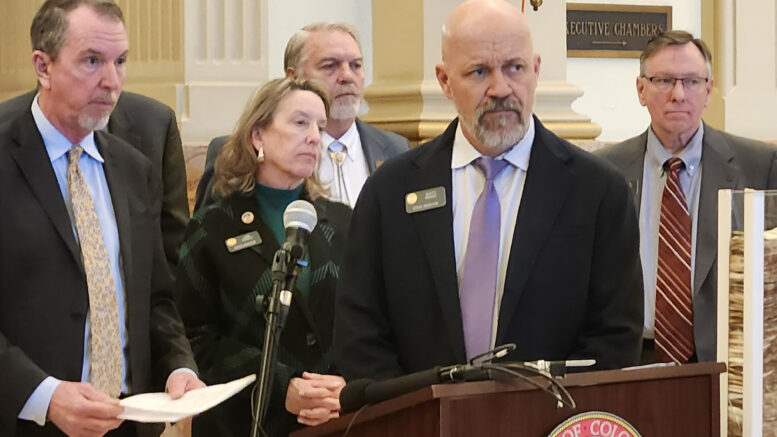Just days after Gov. Jared Polis called for legislators to pass regulatory reform, Colorado Senate Republicans offered the first package to that effect on Tuesday, though it’s unclear whether their proposals are what the governor was seeking.
At a morning news conference, members of the caucus announced a series of bills that Minority Leader Paul Lundeen, R-Monument, said would create an average annual savings of $4,500 per family if passed. The bills involve repeal of new fees and regulatory increases signed since 2019, rollback of regulations concerning homebuilding and new approaches to energy policy.
The announcement follows the December release of a study commissioned by the Colorado Chamber of Commerce that found Colorado is the sixth-most-regulated state and that 45% of its 170,000 rules are redundant or excessive compared to other states.
Both Lundeen and Senate President James Coleman, D-Denver, called in opening-day speeches last week for legislators to streamline regulations, and the Democratic governor followed one day later by urging legislators to re-examine regulations and ask if they adequately balance public safety with the need to minimize business costs. Colorado Chamber leaders have said they plan to push a package of bills that would include an audit of all existing regulations and creation of a legislative regulatory review committee.
A unique approach from Senate Republicans
Senate Republicans, however, did not unveil any legislative auditing or review efforts in the package they unfurled Tuesday in the west foyer of the Capitol, marking it as a different animal than those proposed changes. Instead, they announced plans to target specific rules and fees passed since Democrats took control of the House, Senate and governor’s office in 2019 — rollbacks that are likely to be tough sells to the party that put them into law in the first place.

Colorado Senate Minority Leader Paul Lundeen stands beside a stack of dollar bills totaling $4,500 during a news conference Tuesday about bills to reduce the cost of living.
“This crisis in affordability is no accident. It is a result of the crippling policies enacted by this Legislature,” Lundeen said. “We gather here not only to acknowledge these challenges but to do something about that.”
The majority of the annual cost savings would come from changes in housing policy that include construction-defects reform, though Lundeen was careful to describe his effort as a “companion bill” rather than link it to a coming proposal from Democratic Rep. Shannon Bird that seeks to tackle the lack of affordable new condominiums from several angles. Lundeen said his legislation also would require any housing energy codes adopted by government to be cost-effective, arguing that the state’s adoption of International Energy Conservation Codes is adding as much as $328 per month to the cost of a mortgage.
Senate Republicans target numerous fees
Sen. Mark Baisley, R-Woodland Park, said he will bring bills looking to repeal a 29-cent delivery fee on retail deliveries, a 10-cent fee on paper bags used by retailers, a 75-cent fee on utility bills that goes to the Energy Outreach Colorado program and others. While such fees may seem small on their own, they add up to hundreds of dollars a year for the average Coloradan, Baisley argued.
Newly elected Sen. Scott Bright, R-Platteville, said he will take aim at rising transportation costs, looking to repeal new fees on gas, diesel fuel, rides from transportation network companies like Lyft and Uber and short-term vehicle rentals. Bright also will sponsor a bill that would offset the higher costs of the reformulated gas that Northern Front Range stations must sell because of the area’s noncompliance with federal ozone standards by creating a rebate program using existing enterprise funds.
And Sen. Janice Rich, R-Grand Junction, will seek to repeal clean-air-focused grant programs, mandates reducing greenhouse-gas emissions from buildings, air-pollutant fees that fund air-quality monitoring and fees on products that add perfluoroalkyl and polyfluoroalkyl substances. She also plans a bill that she said would repeal occupational-licensing requirements unless state departments can show they are necessary to protect public health, welfare and safety.

Colorado state Sen. Janice Rich explains the regulatory-rollback bills she plans to introduce during a Capitol news conference on Tuesday.
Viability questions surround package
Asked if Polis had signed onto any of the proposals, Lundeen said there is a wide range of potential regulatory-relief efforts being discussed at this moment without commitment from the state’s top executive to move in any specific direction. He also did not identify any Democrats who have agreed to sponsor the regulatory and fee-cut bills but said Republicans and welcoming members of both parties to join with them.
The discussion around the bills, he hopes, will be part of the larger discussion of how to address the affordability crisis that members of both parties have identified as a priority for the 2025 session, which began just on Jan. 8.
“Many of the regulatory burdens we’ve created are designed to have a global impact,” Lundeen said. “And yet there is no discernible impact for many of the laws and regulations except to make life less affordable in Colorado.”
While Democrats have targeted the cost of living like Republicans, their initial bills seek to attack the issue in different ways, including a crackdown on what they say is an increase in price gouging by retailers and a limit on certain fees that industries like child-care providers can charge. Democrats also have backed many of the fees and regulations that are the subject of proposed GOP repeals because they aim to reduce pollution and protect homeowners and renters, among others.
